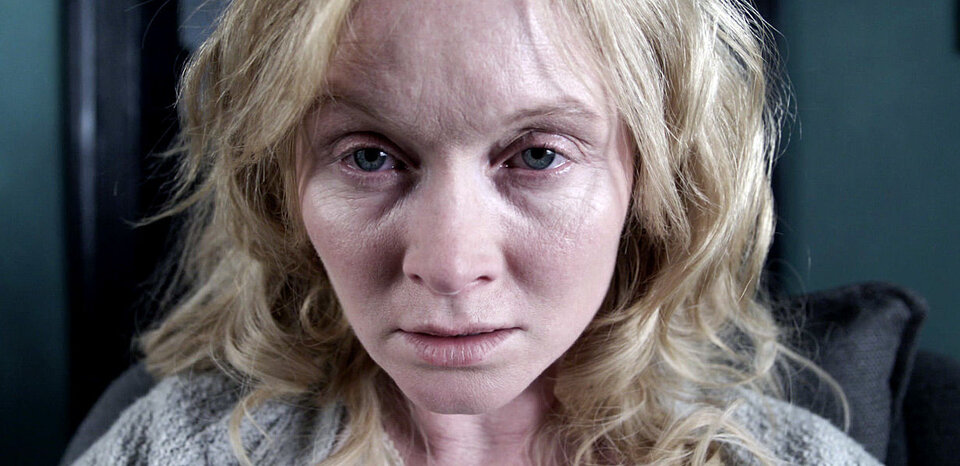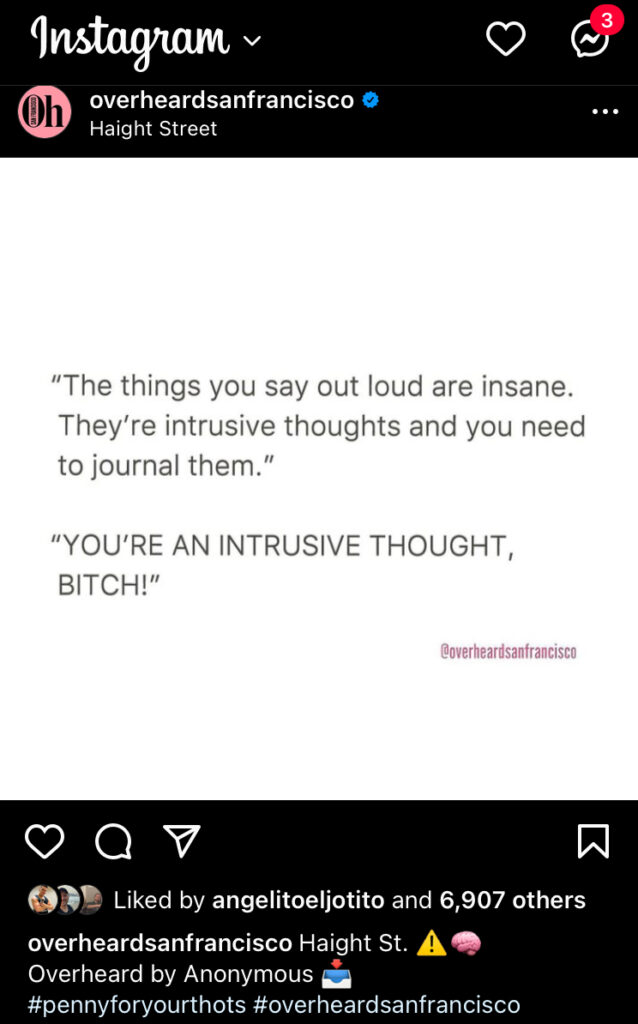Would You Share Your Intrusive Thoughts?
A recent trend with a storied past has emerged with a new phrase in its mouth. Intrusive thoughts are fetching social media buzz. Facebook groups, Instagram stories, BuzzFeed and YouTube videos, all getting it wrong. You don’t lose sleep, stop eating, and consider suicide because of some stupid impulse or embarrassing secret. An intrusive thought scares the hell out of you.
Everyone gets them. For most people, their minds discreetly bat away such images before they can even entertain them. That’s how irrelevant they are, how inconsequential they’re supposed to be. Maybe you grossed yourself out once or twice but immediately dismissed it. Intrusive thoughts are strictly unwanted. Their violent implications completely go against who you are… or are they trying to reveal who you are?

YouTuber Chris Klemens asks New Yorkers to disclose their intrusive thoughts. The single accurate example in the fifteen-minute video.
For some, this becomes a quandary that hooks onto the psyche like a cocklebur or a kidney stone. Intrusive thoughts can generate obsessions, causing a snowball effect. A new mother bathing her infant son freezes when she sees herself drowning him. Doubt splits the psyche like a neutron through an atom. “Who would do such a thing?” becomes “Could I do such a thing?” While her baby stares up at his world, she panics. She insists that somebody else bathe him from then on, afraid she’s no longer who she thought she was.
Psychologists call this “thought-action fusion.” It’s when you believe having a thought will inevitably lead to its enaction. It isn’t just the fear that you’ll carry it out, but that you’re the kind of person who would. You begin to distrust your own brain. Slowly you realize that it and your mind are not the same thing.
Intrusive Thoughts: “True Psychological Horror”

Essie Davis as Amelia Vanek in The Babadook, directed by Jennifer Kent. © Umbrella Entertainment 2014.
Thought-action fusion is the glue that bonds obsession and compulsion. It dictates that because you thought of killing your child, you’re as bad as someone who has. Shame is a potent toxin. The disgust with which you’d react to a Casey Anthony or Scott Peterson turns inward.
Naturally you seek reassurance from your partner, friends and family, but nothing anyone tells you will banish the fear for good. You have a duty to prevent your psychic horror from becoming someone else’s terror; someone else must wash the baby. A different sufferer has the magnetic strip removed from their kitchen wall, knives stowed away, and eventually stops cooking altogether. Some come up with a song they hum to cope with triggering circumstances. My favorite comedian/first unofficial therapist Maria Bamford has a great bit about that.
Each is a compulsion, an act or ritual one engages in hoping to contain the dreaded scenario. Not only are compulsions ineffective. They usually make matters worse. Soon the thoughts recur at increasing intervals. They steadily grow more violent, intruding on your dreams where you truly have no control, making them feel like premonitions. Before long you’re alienated from your own free will, convinced it can kill and torture for you. You may even think you can head it off with suicide, obeying the call of the void. If that’s where you’re at, please proceed to the nearest Emergency Room.
Signs you might be dealing with OCD
If somebody’s intrusive thoughts are getting out of hand, it’s probably messing with their day. They can’t focus as well as they could, at least for not as long. Overwhelmed, they soon become irritable and frustrated. Work output drops or even stops. They grow deeply intolerant of unanswered questions, lack of direction, loose-to-no plans. The promise of no consequences must be clear and secure before they take any action. At home, the quality of sleep degrades as insomnia invades and nightmares take over. Relationships suffer because after work, they’re headed straight home, avoiding potential triggers.
Do you notice your intrusive thoughts? If so, do they interfere with your daily life? How often? While they can theoretically be about anything, four main types exist. Harm and injury is one we’ve already covered, whether it’s hurting yourself or another. Next are those of a sexual nature; “What if I raped my best friend?” After that come the more well-known fears of contamination á la Turtles All The Way Down, followed by religious themes, like being spiritually damned.

Screenshot of a post by Instagram account @OverheardSanFrancisco. Genuine intrusive thoughts are often so difficult to put into words that a therapist’s guidance is necessary.
Whatever their content, they usually leave you feeling responsible for them—overly so, according to psychologists. It is perilous to believe you have absolute control over everything you think, doubly so to believe that you should. Chronic intrusive thoughts are what you call OCD, which is not your partner’s anal-retentiveness. People suffering from anxiety and OCD chase a degree of certainty that does not exist. That’s why therapy is so important. Not only do you learn to disarm those thoughts, you become someone who has disarmed those thoughts often enough that you begin to trust yourself again.
If this sounds painfully familiar, and you think you might need help, call the 24-hour San Francisco Crisis Line (415) 781-0500, or 988 outside of the city.










